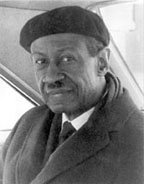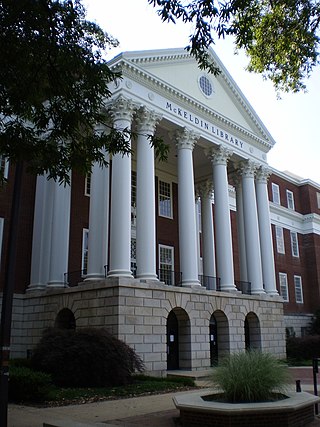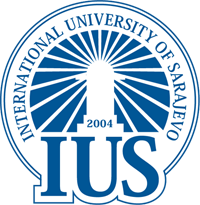Related Research Articles

The American Political Science Association (APSA) is a professional association of political science students and scholars in the United States. Founded in 1903 in the Tilton Memorial Library of Tulane University in New Orleans, it publishes four academic journals: American Political Science Review, Perspectives on Politics, Journal of Political Science Education, and PS: Political Science & Politics. APSA Organized Sections publish or are associated with 15 additional journals.

Cheikh Anta Diop University, also known as the Cheikh Anta Diop University of Dakar, is a university in Dakar, Senegal. It is named after the Senegalese physicist, historian and anthropologist Cheikh Anta Diop and has an enrollment of over 60,000.
The American Council of Learned Societies (ACLS) is a private, nonprofit federation of 75 scholarly organizations in the humanities and related social sciences founded in 1919. It is best known for its fellowship competitions which provide a range of opportunities for scholars in the humanities and related social sciences at all career stages, from graduate students to distinguished professors to independent scholars, working with a number of disciplines and methodologies in the U.S. and abroad.

Punjabi University is a collegiate state public university located in Patiala, Punjab, India. It was established on 30 April 1962 and is only the second university in the world to be named after a language, after Hebrew University of Israel. Originally it was conceived as a unitary multi-faculty teaching and research university, primarily meant for the development and enrichment of the Punjabi language and culture, but alive to the social and education requirements of the state.

African studies is the study of Africa, especially the continent's cultures and societies. The field includes the study of Africa's history, demography, culture, politics, economy, languages, and religion. A specialist in African studies is often referred to as an "africanist". A key focus of the discipline is to interrogate epistemological approaches, theories and methods in traditional disciplines using a critical lens that inserts African-centred “ways of knowing” and references.
East Asian studies is a distinct multidisciplinary field of scholarly enquiry and education that promotes a broad humanistic understanding of East Asia past and present. The field includes the study of the region's culture, written language, history and political institutions. East Asian Studies is located within the broader field of Asian studies and is also interdisciplinary in character, incorporating elements of the social sciences and humanities, among others. The field encourages scholars from diverse disciplines to exchanges ideas on scholarship as it relates to the East Asian experience and the experience of East Asia in the world. In addition, the field encourages scholars to educate others to have a deeper understanding of and appreciation and respect for, all that is East Asia and, therefore, to promote peaceful human integration worldwide.
Sylviane Anna Diouf is a historian and curator of the African diaspora. She is a visiting scholar at the Center for the Study of Slavery and Justice, Brown University and a member of the Scientific Committee of the International Coalition of Sites of Conscience. Her contribution as a social historian, she stressed, "may be the uncovering of essential stories and topics that were overlooked or negated, but which actually offer new insights into the experience of the African Diaspora. A scholar said my work re-shapes and re-directs our understanding of this history; it shifts our attention, corrects the historical record, and reveals hidden and forgotten voices."

James Amos Porter was an African-American art historian, artist and teacher. He is best known for establishing the field of African-American art history and was influential in the African American Art movement.

The National University of Modern Languages (NUMLs) (Urdu: قومی جامعہ برائے جدید لسانیات) is a multi-campus public university with its main campus located in Islamabad, Pakistan and other campuses in different cities of Pakistan.
Paul Tiyambe Zeleza is a Malawian historian, literary critic, novelist, short-story writer and blogger at The Zeleza Post. He was (2009) president of the African Studies Association. He was the Vice-President for Academic Affairs at Quinnipiac University. He is the current Vice Chancellor of the United States International University Africa, located in Nairobi, Kenya.

The University of Maryland Libraries is the largest university library in the Washington, D.C. – Baltimore area. The university's library system includes eight libraries: six are located on the College Park campus, while the Severn Library, an off-site storage facility, is located just outside campus, and the Priddy Library is located on the University System of Maryland satellite campus in Shady Grove.
The Franklin Humanities Institute (FHI) is an interdisciplinary humanities center at Duke University dedicated to supporting humanities, arts, and social science research and teaching. The institute's mission is to encourage humanistic inquiry throughout Duke campus and to raise public awareness of the humanities. Named after the prominent African American historian and civil rights activist John Hope Franklin, who retired from Duke in 1985 as the James B. Duke professor of history, the institute has also made a commitment to promote scholarship that enhances social equity, especially through research on race and ethnicity.

Kyoto Computer Gakuin (KCG) is Japan's first private computer educational institution in Japan founded in 1963 by Yasuko and Shigeo Hasegawa. KCG is the main institution of the KCG Group. KCG’s Eki-mae is the main campus which is centrally located near the Kyoto Station. KCG also has other sites at the Kamogawa Campus which houses the Computer Graphics Art Department and the Rakuhoku Campus where the Computer Informatics Department is found. The KCG group is also composed of The Kyoto College of Graduate Studies for Informatics (KCGI), the Kyoto Japanese Language Training Center (KJLTC), KCG Career, Inc. and KCG Co., Ltd.--- all global education-related institutions. Over nearly half a century, KCG has developed a strong and growing alumni network of 37,000 members who are currently active in the Japanese information industry.
The Hamilton Library at the University of Hawaiʻi at Mānoa is the largest research library in the state of Hawaii. The Library serves as a key resource for the flagship Manoa campus as well as the other University of Hawaii system campuses.
Notre Dame University–Louaize (NDU) is a private Catholic university in Zouk Mosbeh, Lebanon, founded as Louaize College for Higher Education in 1978 in cooperation with Beirut University College. The name was changed to its present name on August 14, 1987, when the President of the Lebanese Republic issued a decree, granting the right to operate an independent university. NDU is accredited by NECHE, and currently ranked 5th in Lebanon, according to its presence on the Web by the Webometrics Ranking of World Universities.

The International University of Sarajevo (IUS) is a private university located in the capital city Sarajevo, Bosnia and Herzegovina. The university was established by the Foundation for the Development of Education in 2004–2005. IUS is open to students from all over the world, and the language of instruction and communication is English. It offers four year education according to Bologna system. IUS has 1650 students from 55 countries and faculty members from 20 countries performing academic and research activities in various disciplines of Science, Engineering, Arts and Social Sciences. The first generation of 32 IUS graduates received their diplomas on June 26, 2009. IUS offers many types of scholarships, especially for students from Bosnia and Herzegovina. IUS has both modern and large campus for the region.

The Center for Khmer Studies is a private American Overseas Research Center working to promote research, teaching and public service in the social sciences, arts and humanities, as they are related to Cambodia and the Mekong region. CKS also aims to connect Cambodian scholars, students and artists with their international colleagues for the purposes of fostering understanding of Cambodia and Southeast Asia.
The Chiang Ching-kuo Foundation for International Scholarly Exchange is a private nonprofit organization located in Taipei, Taiwan, that provides support for research grants on Chinese studies in the humanities and social sciences at overseas institutions. It was founded in 1989 and named after Chiang Ching-kuo, the late President of the Republic of China from 1972 to 1988. The foundation also has a regional office in McLean, Virginia in the United States.

The Council of American Overseas Research Centers (CAORC) is a private not-for-profit association of centers that research, conserve and record cultural heritage and modern societies. CAORC, founded in 1981, helps arrange research projects that span national boundaries, in which member centers collaborate.
Senam Okudzeto is an American and British artist and educator who lives and works in Basel, London, Ghana and New York City.
References
- ↑ "Who We Are". West African Research Association. Boston University African Studies Center. Retrieved 29 August 2017.
- ↑ "American Overseas Research Centers". Council of American Overseas Research Centers. Retrieved 2012-03-28.